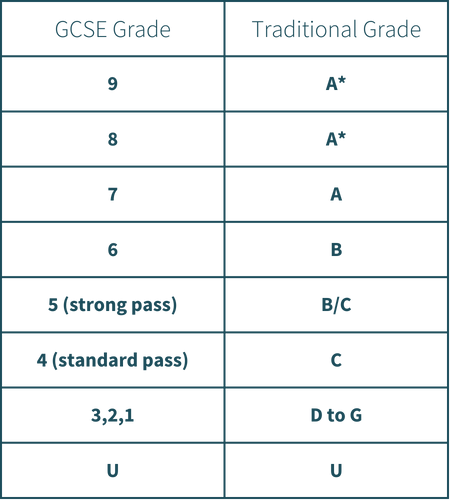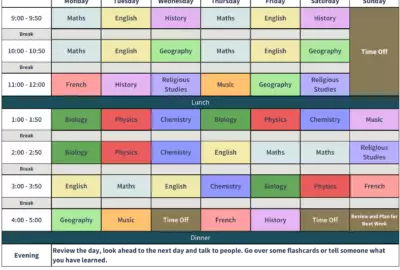Expert Insights
How to Get All 9s in your GCSEs?
Published 20th December 2023 by Alastair

Achieving all 9s in your GCSEs is an exceptionally impressive achievement. It demonstrates your strong work ethic and unwavering commitment to academic excellence. But it's crucial to understand that this accomplishment doesn't come easily; it demands continuous focus and substantial effort on your part.
Why are these grades so significant? Well, they can unlock remarkable opportunities for your future, such as gaining admission to prestigious universities like Oxford, Cambridge, or Ivy League institutions.
This guide will provide you with a wealth of valuable tips and strategies to help you get the highest possible grades in your GCSEs. We will cover effective study techniques, time management, exam preparation, and more, equipping you with the tools needed to excel academically.
The GCSE grading system is based on a numerical scale of 1 to 9, with 9 being the highest grade and 1 being the lowest. Here's a brief overview:
Grade 9: The highest grade, showing outstanding performance and deep knowledge.
Grade 8: Still a strong grade, demonstrating high proficiency.
Grade 7: A good grade, indicating solid knowledge and competence.
Grade 6: A pass grade, showing a reasonable level of understanding.
Grade 5: A "strong" pass, often seen as meeting educational requirements.
Grade 4: A "standard" pass, demonstrating basic proficiency.
Grade 3: Below the standard pass level, with limited achievement.
Grades 2 and 1: The lowest grades, signifying very little or no achievement.
"U" Grade: Stands for "ungraded," meaning performance fell below the standard for a Grade 1.
1.1
To prepare well for your GCSEs, especially if you're aiming for all 9s, it's important to do more than just study right before the exams. You need a smart plan that starts early. Here are some important steps to take before you start revising:
Understand the Exams: Learn about how your GCSE exams are structured and what's expected in them.
Make a Study Plan: Create a schedule for studying that covers several months. Less intensive revision over a longer period of time is always significantly better than last minute cramming.
Get the Right Materials: Gather the books, notes, and resources you'll need for your subjects.
Set Goals: Decide on specific goals for each subject to keep yourself motivated.
Organise Your Notes: Arrange your notes in an organised way so you can easily understand them.
Be Consistent: Stick to a regular study routine to help you remember what you learn.
Ask for Help: Don't be afraid to seek help if you're having trouble with certain topics. This could be from friends, teachers or tutors.
Manage Your Time: Use your study time efficiently, avoid distractions, and stay focused.
Take Care of Yourself: Make sure to get enough sleep, eat well, and exercise to stay healthy.
Deal with Stress: Use relaxation techniques to handle any stress or anxiety related to exams.
To prepare well for your GCSEs, especially if you're aiming for all 9s, it's important to do more than just study right before the exams. You need a smart plan that starts early. Here are some important steps to take before you start revising:
Understand the Exams: Learn about how your GCSE exams are structured and what's expected in them.
Make a Study Plan: Create a schedule for studying that covers several months. Less intensive revision over a longer period of time is always significantly better than last minute cramming.
Get the Right Materials: Gather the books, notes, and resources you'll need for your subjects.
Set Goals: Decide on specific goals for each subject to keep yourself motivated.
Organise Your Notes: Arrange your notes in an organised way so you can easily understand them.
Be Consistent: Stick to a regular study routine to help you remember what you learn.
Ask for Help: Don't be afraid to seek help if you're having trouble with certain topics. This could be from friends, teachers or tutors.
Manage Your Time: Use your study time efficiently, avoid distractions, and stay focused.
Take Care of Yourself: Make sure to get enough sleep, eat well, and exercise to stay healthy.
Deal with Stress: Use relaxation techniques to handle any stress or anxiety related to exams.
The ideal time to start revising for GCSEs can vary from student to student, but generally, it's recommended to begin your revision several months before your exams. Here's a rough timeline to consider:
Early Learning (Years 9-10): Build a strong foundation in secondary school by paying attention in class and doing your assignments.
Intensive Revision (2-4 Months Before Exams): Focus hard on key topics, practise past papers, and improve exam skills.
Consistent Study (Throughout Secondary School): Study regularly over time, which is better than cramming.
Subject-Specific Approach: Some subjects need more time, while others need less – talk to your teachers or tutors for advice.
Remember, every student is different, so adjust your revision schedule to fit your needs. Starting early and learning gradually reduces stress and boosts your chances of getting the grades you want in your GCSEs.
A good GCSE revision plan is crucial for getting ready for your important exams. Here's why it's so helpful:

Time Management: It helps you use your study time efficiently, so you cover all the important topics without forgetting anything.
Consistency: A realistic plan encourages you to study regularly, which makes it easier to remember things in the long run.
Balance: It stops you from focusing too much on one subject and neglecting others.
Improvement: You can spend more time on subjects you're not so good at, so you get better at them.
Stress Relief: Having a plan reduces stress and gives you confidence in your preparation.
In short, a good revision plan is key to getting ready for your GCSEs with confidence and success.
If you want extra help, Ivy Education offers premium private tuition for GCSE students who want to excel do well in their exams.

Create a Study Schedule:
Plan a realistic revision timetable that covers all subjects.
Allocate more time to subjects you find challenging.
Set specific goals for each study session.
Break Tasks into Smaller Chunks:
Divide your revision into smaller, manageable topics or chapters.
Tackle one chunk at a time to avoid feeling overwhelmed.
Active Learning:
Engage with the material actively by summarising, teaching it to someone else, or creating flashcards and mindmaps.
Use mnemonic devices or memory aids to remember key points.
Practise Past Papers:
Use past exam papers to simulate exam conditions.
Review your answers to identify areas that need improvement.
Focus on the types of questions that frequently appear.
Use Effective Study Techniques:
Explore various study techniques, such as the Pomodoro Technique (25-minute focused study followed by a 5-minute break).
Incorporate active recall, spaced repetition, and interleaved learning into your study routine.
Stay Organised:
Keep your notes, study materials, and resources well-organised.
Use colour-coding or digital tools to categorise and access information easily.
Take Regular Breaks:
Avoid marathon study sessions by taking short, regular breaks.
Breaks help maintain focus and prevent burnout.
Stay Healthy:
Get enough sleep to support memory consolidation.
Maintain a balanced diet and stay hydrated.
Incorporate physical activity into your routine to reduce stress.
Self-Testing:
Test yourself regularly on the material you've studied.
Self-assessment helps reinforce your knowledge and identify weak areas.
Utilise Resources:
Seek help from teachers, tutors, or online resources when you encounter difficulties.
Join study groups for collaborative learning.
Prioritise Past Exam Papers:
Focus on recent papers and the most relevant topics based on your syllabus.
Practise under timed conditions to improve your exam speed.
Maintain a Growth Mindset:
Embrace challenges as opportunities for growth.
Stay positive and believe in your ability to improve.
Monitor Progress:
Keep track of your revision progress by marking completed topics.
Adjust your schedule as needed based on your progress.
Stay Consistent:
Stick to your study schedule even when motivation wanes.
Consistency is key for long-term retention.
Review and Reflect:
Periodically review previously studied material to reinforce your memory.
Reflect on your revision techniques and adjust them for better results.
Efficient GCSE revision involves a combination of effective study techniques, time management, and a positive mindset. Tailor your approach to suit your learning style and needs to make the most of your revision time.
Here are some techniques to help you revise for your GCSEs:
Note-Taking: Take organised, concise notes during lessons, lectures or while reading.
Colour Coding: Use colour to highlight key points, categories, or themes in your notes.
Summarisation: Write concise summaries of textbook chapters or lecture notes.
Active Recall: Test yourself on the material to actively retrieve information from memory.
Spaced Repetition: Review and revisit information at increasing intervals to enhance long-term retention.
Flashcards: Create flashcards with questions on one side and answers on the other for quick self-quizzing.
Mind Maps: Use visual diagrams to organise and connect key concepts and ideas.
Mnemonic Devices: Create acronyms, rhymes, or visual associations to remember complex information.
Practise Questions: Solve practice questions, quizzes, and past papers to apply your knowledge.
Group Study: Join or create study groups to discuss and clarify concepts with peers.
Teaching Others: Explaining a topic to someone else helps reinforce your understanding.
Online Resources: Explore online tutorials, videos, and educational websites for additional explanations and examples.
Studying for your GCSEs with Ivy Education tutors means you get tailored help. Our tutors are experts in the subjects and exam boards, and can teach you the best ways to study. They give you extra practice and tell you how to get better.
Ivy Education
tutors don't just help you with your GCSEs; they also prepare you for
future school and job opportunities. They use their knowledge,
encouragement, and flexibility to help you do really well in your
studies and reach your full potential.
Getting all 9s in GCSEs is an exceptional achievement. It shows you're dedicated and want to do your best. These grades can lead to great academic chances and success in your final years of school and at university.
But don't forget, doing your best is what really counts. Stay focused, keep working hard, and know that your effort will pay off, no matter what grades you get.
Best of luck on your GCSE journey!
We offer expert GCSE Tuition, in-person or online. Submit an enquiry and get an expert tutor to help you with your revision.
Submit an Enquiry















